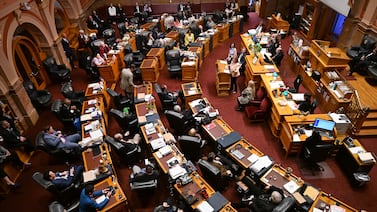This story was originally published by The 19th and is republished under a Creative Commons license. Sign up for The 19th’s newsletter here.
Since President Joe Biden first took office, advocates for sexual violence survivors and the LGBTQ+ community have pressured his administration to update the federal regulations that protect such groups from discrimination in schools and colleges.
Now that day is here.
The Department of Education announced on Friday that it has finalized the rule under Title IX — the historic federal civil rights law — that prevents academic institutions that receive federal funding from discriminating on the basis of sex.
“For over half a century, Title IX has opened doors, expanded access and promised fairness,” Secretary of Education Miguel Cardona said on Thursday during a call with reporters. “Before Title IX was passed in 1972, women and girls didn’t have equal access to education in this country. That was unacceptable then, and it’s unfathomable now. Title IX promises that no person experiences sex discrimination including sex-based harassment or sexual violence in federally funded education.”
Advocates have argued the new regulations are necessary after former Secretary of Education Betsy DeVos in 2020 rolled back safeguards by narrowing the definition of sexual harassment, giving protections to alleged perpetrators, failing to protect LGBTQ+ students and instituting controversial rules for questioning during misconduct hearings. Although Title IX is a federal law, each administration takes a different approach to enforcing its regulations about sex discrimination.
After suggesting updates to the regulations in 2022, the Department of Education fielded over 240,000 public comments that it took under consideration during its rulemaking process. The newly finalized Title IX rule under Cardona not only repeals many of the DeVos-era changes but also represents “the most comprehensive coverage under Title IX since the regulations were first promulgated in 1975,” said Catherine Lhamon, assistant secretary for the Office of Civil Rights at the Department of Education, during Thursday’s call with reporters. “The final regulations encourage reporting of sex discrimination under Title IX and require institutions to respond promptly and effectively.” The 2020 regulations asked little of schools, only tasking them with not deliberately ignoring sexual harassment, she added.
As Biden faces an election rematch with former President Donald Trump, the presumptive Republican nominee, Department of Education officials made a point to contrast the updated Title IX regulations with those of the Trump era. Rather than weaken protections for sexual violence survivors, LGBTQ+ people and pregnant people, their regulations strengthen them, they said.
“These regulations make it crystal clear that everyone can access schools that are safe, welcoming and that respect their rights,” Cardona said. “They clarify that Title IX’s prohibition of sex discrimination includes all forms of sex discrimination. No one should have to give up their dreams of attending or finishing school because they’re pregnant. No one should face bullying or discrimination just because of who they are or who they love. Sadly, this happens all too often.”
The final regulations intend for students and school personnel to get the support needed if they experience sex discrimination and for schools to resolve complaints with fairness and accuracy, according to the Department of Education. Although the newly finalized regulations restore a number of protections that the DeVos era ones gutted, the Department of Education emphasized that it will give schools flexibility to resolve sex discrimination complaints in a way that is appropriate for their school size and administrative processes.
The final rule also describes what sex-based harassment and sex discrimination are, noting that schools must provide an educational environment free of biases “based on sex stereotypes, sex characteristics, pregnancy or related conditions, sexual orientation, and gender identity.”
Department of Education officials said that the new regulations could address the disturbing trend of pornographic deepfake images circulating in schools, a phenomenon that was not even a possibility when Title IX was first established in the 1970s. Lhamon said that if deepfake harassment creates a hostile environment in a school setting that it could also constitute sex discrimination under the federal law.
“The school would need to take prompt and effective steps to ensure nondiscrimination for the students on the basis of sex moving forward,” she said.
The regulations acknowledge that stopping someone from experiencing school in a way that’s consistent with their gender identity causes harm, but they do not address whether transgender or nonbinary students qualify to participate on sports teams that align with their identity. They also do not prevent religious institutions from discriminating against LGBTQ+ students or staff.
“The Title IX statute itself exempts religiously controlled institutions, and the regulations are unchanged in tracking that statute,” Lhamon said.
The regulations also stress the rights of parents and guardians to advocate for their children and the needs of individuals who allege they have experienced sex discrimination. They protect students and staff from reprisal, including from peers, related to their rights under Title IX.
Tracey Vitchers, executive director of It’s On Us, a nonprofit that works to end college sexual assault, welcomed the Biden administration’s final Title IX rule. She said that survivors and advocates have fought tirelessly for these reforms dating back to when the Trump administration took office.
“It’s On Us has long advocated for updated Title IX regulations that prioritize the protection of all students and survivors of sexual assault,” she said. “We are glad that the Biden administration finally fulfilled its promise to student survivors to return Title IX to its original intent of protecting their civil rights in the aftermath of sexual violence.”







